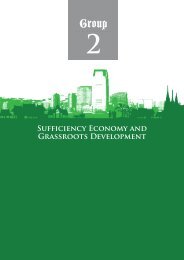Conflict, Legitimacy and Government Reform: Equitable Allocation of ...
Conflict, Legitimacy and Government Reform: Equitable Allocation of ...
Conflict, Legitimacy and Government Reform: Equitable Allocation of ...
You also want an ePaper? Increase the reach of your titles
YUMPU automatically turns print PDFs into web optimized ePapers that Google loves.
Judicial Activism<br />
Judicial Review <strong>and</strong> Judicial Activism<br />
Prasit Piwawattanapanich<br />
Lecturer at the Faculty <strong>of</strong> Law, Thammasat University<br />
The idea <strong>of</strong> judicial activism was first<br />
developed in the United States <strong>of</strong><br />
America. Academics still debate the<br />
definition <strong>of</strong> judicial activism because<br />
different scholars interpret the meaning <strong>of</strong><br />
the term differently. Notably, the early study<br />
<strong>of</strong> judicial activism was <strong>of</strong> interest to<br />
American political scientists who wanted to<br />
evaluate whether judges’ deliberation<br />
processes were free from political influence<br />
(in general meaning). Political scientists use<br />
the behavioural or structural approaches to<br />
achieve a better underst<strong>and</strong>ing <strong>of</strong> the court<br />
system by considering judge recruitment<br />
processes <strong>and</strong> career paths, as well power<br />
relationships concerning the courts,<br />
particularly in the American federalist<br />
system.<br />
Additionally, the idea <strong>of</strong> judicial<br />
activism was created at the same time as the<br />
145














